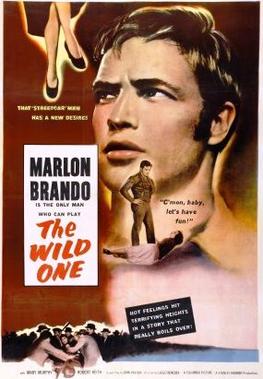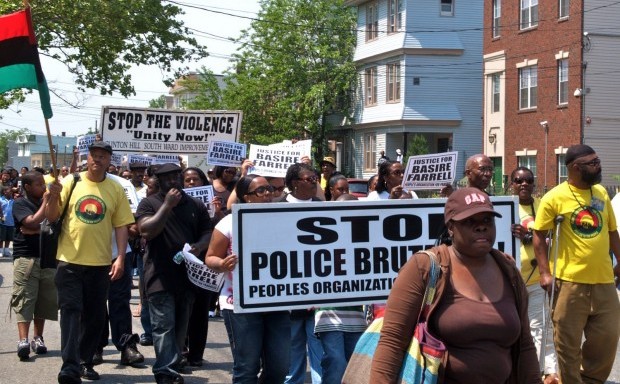DVD Review
The Wild One, Marlon Brando, Lee Marvin, produced by Stanley Kramer, 1954
Okay here is the book of genesis, the motorcycle book of genesis, or at least my motorcycle book of genesis. But, before I get to that let me make about seventy–six disclaimers. First, the whys and wherefores of the motorcycle culture, except on those occasions when they become subject to governmental investigation or impact some cultural phenomena, is outside the purview of the leftist politics that dominate my commentaries. There is no Marxoid political line, as a rule, on such activity, nor should there be. Those exceptions include when motorcyclists, usually under the rubric of “bad actor” motorcycle clubs, like the famous (or infamous) Oakland, California-based Hell’s Angels are generally harassed by the cops and we have to defend their right to be left alone (you know, those "helmet laws", and the never-failing pull-over for "driving while biker") or, like when the Angels were used by the Rolling Stones at Altamont and that ill-advised decision represented a watershed in the 1960s counter-cultural movement. Or, more ominously, from another angle when such lumpen formations form the core hell-raisers of anti-immigrant, anti-communist, anti-gay, anti-women, anti-black liberation fascistic demonstrations and we are compelled, and rightly so, to go toe to toe with them. Scary yes, necessary yes, bikes or no bikes.
Second, in the interest of full disclosure I own no stock, or have any other interest, in Harley-Davidson, or any other motorcycle company. Third, I do not now, or have I ever belonged to a motorcycle club or owned a motorcycle, although I have driven them, or, more often, on back of them on occasion. Fourth, I do not now, knowingly or unknowingly, although I grew up in working class neighborhoods where bikes and bikers were plentiful, hang with such types. Fifth, the damn things and their riders are too noisy, despite the glamour and “freedom” of the road associated with them. Sixth, and here is the“kicker”, I have been, endlessly, fascinated by bikes and bike culture as least since early high school, if not before, and had several friends who “rode”.Well that is not seventy-six but that is enough for disclaimers.
Okay, as to genesis, motorcycle genesis. Let’s connect the dots. A couple of years ago, and maybe more, as part of a trip down memory lane, the details of which do not need detain us here, I did a series of articles on various world-shaking, earth-shattering subjects like high school romances, high school hi-jinx, high school dances, high school Saturday nights, and most importantly of all, high school how to impress the girls( or boys, for girls, or whatever sexual combinations fit these days, but you can speak for yourselves, I am standing on this ground). In short, high school sub-culture, American-style, early 1960s branch, although the emphasis there, as it will be here, is on that social phenomena as filtered through the lenses of a working- class town, a seen better days town at that, my growing up wild-like-the-weeds town.
One of the subjects worked over in that series was the search, the eternal search I might add, for the great working class love song. Not the Teen Angel, Earth Angel, Johnny Angel generic mush that could play in Levittown, Shaker Heights or La Jolla as well as Youngstown or Moline. No, a song that, without blushing, one could call one’s own, our working- class own, one that the middle and upper classes might like but would not put on their dance cards. As my offering to this high-brow debate I offered a song by written by Englishman Richard Thompson (who folkies, and folk rockers, might know from his Fairport Convention days, very good days, by the way), Vincent Black Lightning, 1952. (See lyrics below.) Without belaboring the point the gist of this song is the biker romance, British version, between outlaw biker James and black-leathered, red-headed Molly. Needless to say such a tenuous lumpen existence as James leads to keep himself “biked" cuts short any long term“little white house with picket fence” ending for the pair. And we do not need such a boring finish. For James, after losing the inevitable running battle with the police, on his death bed bequeaths his bike, his precious “Vincent Black Lightning”, to said Molly. His BIKE, man. His BIKE. Is there any greater love story, working class love story, around? No, this makes West Side Story lyrics and a whole bunch of other such songs seem like so much cornball nonsense. His BIKE, man. Wow! Kudos, Brother Thompson.
Needless to say that exploration was not the end, but rather the beginning of thinking through the great American night bike experience. And, of course, for this writer that means going to the books, the films and the memory bank to find every seemingly relevant “biker” experience. Thus, readers were treated to reviews of such classic motorcycle sagas as “gonzo” journalist, Doctor Hunter S. Thompson’s Hell’s Angels and other, later Rolling Stonemagazine printed “biker” stories and Tom Wolfe’ Hell Angel’s-sketched Electric Kool-Aid Acid Test (and other articles about California subset youth culture that drove Wolfe’s work in the old days). And to the hellish Rolling Stones (band) Hell’s Angels “policed” Altamont concert in 1969. And, as fate would have it, with the passing of actor/director Dennis Hooper, the 1960s classic biker/freedom/ seeking the great American night film, Easy Rider. And from Easy Rider to the “max daddy” of them all, tight-jeaned, thick leather-belted, tee-shirted, engineer-booted, leather-jacketed, taxi-driver-capped (hey, that’s what it reminds me of), side-burned, chain-linked wielding, hard-living, alienated, but in the end really just misunderstood, Johnny, aka, Marlon Brando, in The Wild One.
Okay, we will cut to the chase on the plot. Old Johnny and his fellow“outlaw” motorcycle club members are out for some weekend “kicks” after a hard week’s non-work (as far as we can figure out, work was marginal for many reasons, as Hunter Thompson in Hell’s Angels noted, to biker existence, the pursue of jack-rolling, armed robbery or grand theft auto careers probably running a little ahead) out in the sunny California small town hinterlands.(They are still heading out there today, the last time I noticed, in the Southern California high desert, places like Twenty-Nine Palms and Joshua Tree.)
And naturally, when the boys (and they are all boys here, except for couple of “mamas”, one spurned by Johnny, in a break-away club led by jack-in-the-box jokester, Lee Marvin as Chino) hit one small town they, naturally, after sizing up the local law, head for the local café (and bar). And once one mentions cafes in small towns in California (or Larry McMurtry’s West Texas, for that matter), then hard-working, trying to make it through the shift, got to get out of this small town and see the world, dreamy-eyed, naïve (yes, naive) sheriff-daughtered young waitress, Kathy, (yes, and hard-working, it’s tough dealing them off the arm in these kind of joints, or elsewhere) Johnny trap comes into play. Okay, now you know, even alienated, misunderstood, misanthropic, cop-hating (an additional obstacle given said waitress’s kinships) boy Johnny needs, needs cinematically at least, to meet a girl who understands him.
The development of that young hope, although hopeless, boy meets girl romance relationship, hither and yon, drives the plot. Natch. Oh, and along the way the boys, after a few thousand beers, as boys, especially girl-starved biker boys, will, at the drop of a hat start to systematically tear down the town, for fun. Needless to say, staid local burghers (aka “squares”) seeing what amount to them is their worst 1950s “communist” invasion nightmare, complete with murder, mayhem and rapine, (although that “C” word was not used in the film, nor should it have been) are determined to “take back” their little town. A few fights, forages, casualties, fatalities, and forgivenesses later though, still smitten but unquenched and chaste Johnny (and his rowdy crowd) and said waitress part, wistfully. The lesson here, for the kids in the theater audience, is that biker love outside biker-dom is doomed. For the adults, the real audience, the lesson: nip the “terrorists” in the bud (call in the state cops, the national guard, the militia, the 82nd Airborne, The Strategic Air Command, NATO, hell, even the weren't we buddies in the war Red Army , but nip it, fast when they come roaming through Amityville, Archer City, or your small town).
After that summary you can see what we are up against. This is pure fantasy Hollywood cautionary tale on a very real 1950s phenomena, “outlaw” biker clubs, mainly in California, but elsewhere as well. Hunter Thompson did yeoman’s work in his Hell’s Angels to “discover” who these guys were and what drove them, beyond drugs, sex, rock and roll (and, yah, murder and mayhem, the California prison system was a “home away from home”). In a sense the “bikers”were the obverse of the boys (again, mainly) whom Tom Wolfe, in many of his early essays, was writing about and who were (a) forming the core of the surfers on the beaches from Malibu to La Jolla and, (b) driving the custom car/hot rod/drive-in centered (later mall-centered) cool, teenage girl–impressing, car craze night in the immediate post-World War II great American Western sunny skies and pleasant dream drift (physically and culturally). Except those Wolfe guys were the “winners”. The “bikers” were Nelson Algren’s “losers”, the dead-enders who didn’t hit the gold rush, the Dove Linkhorns (aka the Arkies and Okies who in the 1930s populated John Steinbeck’s Joad saga, The Grapes Of Wrath). Not cool, iconic Marlin-Johnny but hell-bend then-Hell Angels leader, Sonny Barger.
And that is why in the end, as beautifully sullen and misunderstood the alienated Johnny was, and as wholesomely rowdy as his gang was before demon rum took over, this was not the real “biker: scene, West or East. Now I lived, as a teenager in a working class, really marginally working poor, neighborhood that I have previously mentioned was the leavings of those who were moving up in post-war society. That neighborhood was no more than a mile from the central headquarters of Boston's local Hell’s Angels (although they were not called that, I think it was Deathheads, or something like that). I got to see these guys up close as they rallied at various spots on our local beach or “ran”through our neighborhood on their way to some crazed action. The leader had all of the charisma of Marlon Brando’s thick leather belt. His face, as did most of the faces, spoke of small-minded cruelties (and old prison pallors) not of misunderstood youth. And their collective prison records (as Hunter Thompson also noted about the Angels) spoke of “high” lumpenism. And that takes us back to the beginning about who, and what, forms one of the core cohorts for a fascist movement in this country, the sons of Sonny Barger. Then we will need to rely on our Marxist politics, and other such weapons.
*************
ARTIST: Richard Thompson
TITLE: 1952 Vincent Black Lightning
Lyrics and Chords
Said Red Molly to James that's a fine motorbike
A girl could feel special on any such like
Said James to Red Molly, well my hat's off to you
It's a Vincent Black Lightning, 1952
And I've seen you at the corners and cafes it seems
Red hair and black leather, my favorite color scheme
And he pulled her on behind
And down to Box Hill they did ride
/ A - - - D - / - - - - A - / : / E - D A /
/ E - D A - / Bm - D - / - - - - A - - - /
Said James to Red Molly, here's a ring for your right hand
But I'll tell you in earnest I'm a dangerous man
I've fought with the law since I was seventeen
I robbed many a man to get my Vincent machine
Now I'm 21 years, I might make 22
And I don't mind dying, but for the love of you
And if fate should break my stride
Then I'll give you my Vincent to ride
Come down, come down, Red Molly, called Sergeant McRae
For they've taken young James Adie for armed robbery
Shotgun blast hit his chest, left nothing inside
Oh, come down, Red Molly to his dying bedside
When she came to the hospital, there wasn't much left
He was running out of road, he was running out of breath
But he smiled to see her cry
And said I'll give you my Vincent to ride
Says James, in my opinion, there's nothing in this world
Beats a 52 Vincent and a red headed girl
Now Nortons and Indians and Greeveses won't do
They don't have a soul like a Vincent 52
He reached for her hand and he slipped her the keys
He said I've got no further use for these
I see angels on Ariels in leather and chrome
Swooping down from heaven to carry me home
And he gave her one last kiss and died
And he gave her his Vincent to ride









